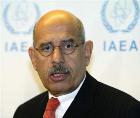New evidence, no progress on Iran nuclear allegations
 Vienna - Iran is continuing to expand its uranium enrichment programme while obfuscating UN efforts to verify the nature of the country's nuclear ambitions, the Director General of the International Atomic Energy Agency (IAEA) said on Monday.
Vienna - Iran is continuing to expand its uranium enrichment programme while obfuscating UN efforts to verify the nature of the country's nuclear ambitions, the Director General of the International Atomic Energy Agency (IAEA) said on Monday.
Mohamed ElBaradei also said that the agency had new information relating to past Iranian nuclear weapons-related studies, but had had no cooperation from the latter in clarifying their details.
"The agency, regrettably, has not been able to make any substantive progress on the alleged studies and other associated key remaining issues which remain of serious concern," IAEA Director General Mohamed ElBaradei wrote in his report to the agency's board members.
ElBaradei wrote that since the last IAEA report in May, Iran has continued to defy United Nations Security Council resolutions by expanding its uranium enrichment programme at its facility at Natanz. Iran is now operating close to 3,800 centrifuges, 200 more than stated in the May report.
So far, the facility has produced a total of 480 kilograms of low-grade enriched uranium, the report said.
However, Iran would need 1,700 kg for a "break-out scenario" in which Tehran would have enough low-grade enriched uranium to enrich it further for use in an atom bomb, a UN official said. It would take two more years until Iran reached that amount, he said.
The IAEA has also been trying to find out whether past Iranian projects on uranium conversion, high-explosives testing and missiles were related to nuclear weapons.
According to the report, the IAEA's analysis shows that the dimensions of the hemispherical charge in an explosives test corresponded to the dimensions of a warhead documented in Iran's alleged missile studies.
The IAEA previously found indications that the missile project was geared towards nuclear weapons.
The information that the Vienna-based agency had received from a number of member countries was "of such a quality that Iran has to take it seriously" and had to provide a "substantive response," a UN official said.
"These studies point to real people, real organization," the official said, adding that they appeared to be linked to procurement activities by military organizations in Iran.
While Iran denies that it has conducted most of the alleged projects, including the explosion tests, ElBaradei wrote that the IAEA had obtained information that the experiments "may have involved the assistance of foreign expertise."
The director general also noted that his inspectors had not found evidence of actual nuclear weapons manufacturing.
Iranian officials reacted by saying the latest report was based on an "illogical approach" by the IAEA towards Iran, the official news agency IRNA said Monday.
"If the IAEA adopted a logical course beyond any political pressures, then all the remaining and limited questions could be settled easily," IRNA quoted unnamed Iranian nuclear officials as saying.
Gregory Schulte, the United States' ambassador at the UN in Vienna, said Iran's reluctance to address outstanding issues - in violation of Security Council resolutions - was "particularly troubling, as it continues to develop its capacity to produce fissile material that could be weaponized in a nuclear bomb."
So far, the Security Council has passed three rounds of sanctions against Tehran in an attempt to speed up Iran's cooperation with the IAEA, and to pressure it to suspend its enrichment programme.
While the United States and other Western countries are concerned about the possibility of a nuclear "break-out," Iran's leaders stress that its nuclear programme is geared solely towards energy generation.
UN officials said Iran was not focusing on the substance of the nuclear weapons studies allegations, but on its demand to see original documents obtained by the IAEA, rather than electronic copies.
Iran should tell agency experts "what is right in the documents, not what is wrong in the documents," a UN official said.
"We are at a gridlock, because without Iran's assistance and cooperation, we will not be able to substantially clarify this issue," another UN official said. (dpa)